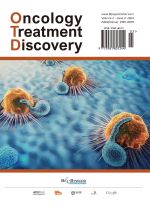Abstract
Breast cancer is a major problem in the health sector worldwide. The prevalence of breast cancer incidence is on the rise in many countries despite efforts to eradicate it. The substantial efforts for the treatment of breast cancer are quite successful but the main hindrance is early detection which in turn is dependent on various factors i.e. genetic history, environmental exposures, hormonal causes, and sedentary lifestyle. In previous studies, lncRNAs were known to modulate the progression of many cancers like gastric, lung, ovarian, and colorectal cancers. This study was designed to find these lncRNAs role in breast cancer development. Bioinformatics tools were used for in silco analysis of these lncRNAs LINC01356, LINC01357, ARF4-AS1, and FAM83B. These lncRNAs were evaluated in GEPIA2 for subtype analysis and survival probability, Phylo CSF UCSC genome browser for conserved sequences and protein-coding potential, BcGenExMiner for correlation analysis and UALCAN for protein-coding gene expression. These above-mentioned lncRNAs showed high expression in the basal subtype of TNBC as compared with other subtypes and they showed poor survival rates in the basal subtype. LINC01356 and LINC01357 showed positive correlation with TAFA3 and SLC16A1. ARF4-AS1 positively correlated with ASB14 and FAM83B positively correlated with HCRTR2. These lncRNAs showing positive correlation with different genes have a role in breast cancer development and progression.
References
Zubair M, Wang S, Ali N, 2021, Advanced Approaches to Breast Cancer Classification and Diagnosis. Frontiers in Pharmacology, 11: 632079.
Zavala VA, Bracci PM, Carethers JM, et al., 2021, Cancer Health Disparities in Racial/Ethnic Minorities in the United States. British Journal of Cancer, 124(2): 315–332.
Martini R, Newman L, Davis M, 2022, Breast Cancer Disparities in Outcomes; Unmasking Biological Determinants Associated with Racial and Genetic Diversity. Clinical & Experimental Metastasis, 39(1): 7–14.
Roheel A, Khan A, Anwar F, et al., 2023, Global Epidemiology of Breast Cancer Based on Risk Factors: A Systematic Review. Frontiers in Oncology, 13: 1240098.
Kazemi A, Barati-Boldaji R, Soltani S, et al., 2021, Intake of Various Food Groups and Risk of Breast Cancer: A Systematic Review and Dose-Response Meta-Analysis of Prospective Studies. Advances in Nutrition, 12(3): 809–849.
Mattick JS, Amaral PP, Carninci P, et al., 2023, Long Non-Coding RNAs: Definitions, Functions, Challenges and Recommendations. Nature Reviews Molecular Cell Biology, 24(6): 430–447.
Mangiavacchi A, Morelli G, Orlando V, 2023, Behind the Scenes: How RNA Orchestrates the Epigenetic Regulation of Gene Expression. Frontiers in Cell and Developmental Biology, 11: 1123975.
Kazimierczyk M, Wrzesinski J, 2021, Long Non-Coding RNA Epigenetics. International Journal of Molecular Sciences, 22(11): 6166.
Yu W, et al., 2021, Identification of Immune-Related lncRNA Prognostic Signature and Molecular Subtypes for Glioblastoma. Frontiers in Immunology, 12: 706936.
Constanty F, Shkumatava A, 2021, lncRNAs in Development and Differentiation: From Sequence Motifs to Functional Characterization. Development, 148(1): dev182741.
Deogharia M, Gurha P, 2022, The “Guiding” Principles of Noncoding RNA Function. Wiley Interdisciplinary Reviews: RNA, 13(4): e1704.
Kan RL, Chen J, Sallam T, 2022, Crosstalk Between Epitranscriptomic and Epigenetic Mechanisms in Gene Regulation. Trends in Genetics, 38(2): 182–193.
Lee JE, Kim M-Y, 2022, Cancer Epigenetics: Past, Present and Future. Seminars in Cancer Biology, 83: 4–14.
De Martino M, Esposito F, Pallante P, 2021, Long Non-Coding RNAs Regulating Multiple Proliferative Pathways in Cancer Cells. Translational Cancer Research, 10(6): 3140.
Gandhi P, Wang Y, Li G, Wang S, 2024, The Role of Long Noncoding RNAs in Ocular Angiogenesis and Vascular Oculopathy. Cell & Bioscience, 14(1): 39.
Wang M-Q, Zhu W-J, Gao P, 2021, New Insights into Long Non-Coding RNAs in Breast Cancer: Biological Functions and Therapeutic Prospects. Experimental and Molecular Pathology, 120: 104640.
Wang W, Min L, Qiu X, et al., 2021, Biological Function of Long Non-Coding RNA (LncRNA) Xist. Frontiers in Cell and Developmental Biology, 9: 645647.
Burstein HJ, 2022, Unmet Challenges in Systemic Therapy for Early-Stage Breast Cancer. The Breast, 62: S67–S69.
Yi Y, et al., 2021, Tumor-Derived Exosomal Non-Coding RNAs: The Emerging Mechanisms and Potential Clinical Applications in Breast Cancer. Frontiers in Oncology, 11: 738945.
Nguyen YT, Ha HT, Nguyen TH, et al., 2022, The Role of SLC Transporters for Brain Health and Disease. Cellular and Molecular Life Sciences, 79: 1–21.
Gaballah A, Bartosch B, 2022, An Update on the Metabolic Landscape of Oncogenic Viruses. Cancers, 14(23): 5742.
Chan KI, Zhang S, Li G, et al., 2024, MYC Oncogene: A Druggable Target for Treating Cancers with Natural Products. Aging Disease, 15(2): 640–697.
Cheung S, Ng L, Xie P, et al., 2024, Genetic Profiling of Azoospermic Men to Identify the Etiology and Predict Reproductive Potential. Journal of Assisted Reproduction and Genetics, 41(4): 1111–1124.
Xie D, Dai L, Yang X, et al., 2023, A Survival Model Based on the ASB Genes and Used to Predict the Prognosis of Kidney Renal Clear Cell Carcinoma. Genetics Research, 2023: e22.
Krebs LC, Santos MMM, Siqueira MC, et al., 2024, Candidate Genes for Height Measurements in Campolina Horses. Animal Production Science, 64(1): 23071.
Shao Y, Zhao C, Pan J, et al., 2021, BMP5 Silencing Inhibits Chondrocyte Senescence and Apoptosis as Well as Osteoarthritis Progression in Mice. Aging (Albany NY), 13(7): 9646–9664.
